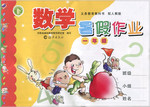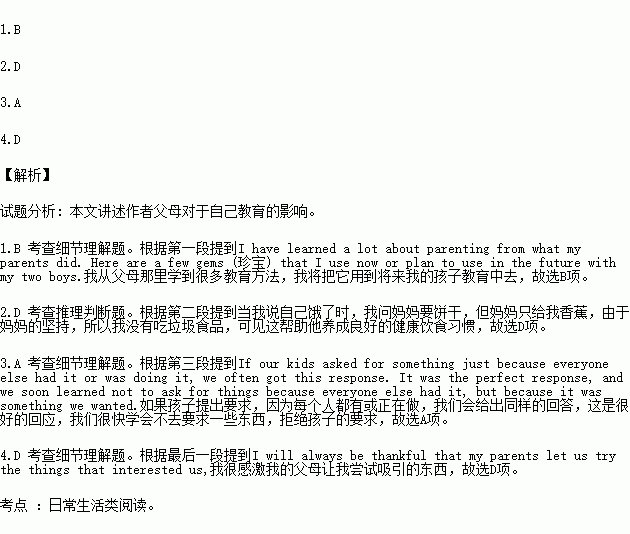题目内容
My parents are amazing. I had the most wonderful childhood, and it’s not because I had everything I wanted or because I was a cool kid. I have learned a lot about parenting from what my parents did. Here are a few gems (珍宝) that I use now or plan to use in the future with my two boys.
Here’s how a conversation often went when I was a kid. Usually it was around 4:30 p.m. I said, “I’m hungry. Can I have a cookie?” My mom answered, “No. Have a banana.” “I don’t want a banana.” “Then you’re not hungry.” Sometimes I was angry about it, but I knew that was good for me. Thanks mom for not letting me eat junk food (垃圾食品). Now I agree with my mother and I have this same conversation with my three-year-old son. I hope it helps him form healthy diet habits.
I know many of us heard this as children. “If everyone jumped off a bridge, would you do it, too?” If our kids asked for something just because everyone else had it or was doing it, we often got this response. It was the perfect response, and we soon learned not to ask for things because everyone else had it, but because it was something we wanted.
I will always be thankful that my parents let us try the things that interested us, not the things they wanted to push us into. This helped me try swimming, dance, and the piano before second grade. I found a love — singing — and kept up with that through my college years. It drives me crazy, as a mom and teacher, when I see kids who are pushed into their parents’ favorite activities, even when they don’t have a passion for them.
1.What are the gems in the writer’s mind?
A. Her parents’ knowledge.
B. Her parents’ educational methods.
C. Her parents’ love.
D. Her parents’ personalities.
2. Why does the writer mention the conversation with her mother in Paragraph 2?
A. To show her mother was so strict with her.
B. To stress the importance of healthy diet habits.
C. To show her mother was not concerned about her.
D. To show how her mother helped her develop healthy diet habits.
3.The response from the writer’s parents in Paragraph 3 is mainly used to .
A. refuse their kid’s same request
B. meet their kid’s right request
C. tell their kid not to be in danger
D. tell the good from the bad
4.Which of the following may be supported by the writer?
A. The children must do what their parents want them to.
B. The children can do anything that they want to.
C. The children must do what is useful to society.
D. The children can try the things that interest them.
 暑假作业海燕出版社系列答案
暑假作业海燕出版社系列答案书面表达
五一小长假即将来临, 你班同学就五一假期计划进行讨论,提出了不同看法,请根据提示写一篇短文,并谈谈你的看法。
优 点 | 缺 点 | |
待在家中 | 花费少、舒适方便 | 不能亲身了解外界 |
外出旅游 | 增长知识、开阔眼界 | 花费多、旅途不便 |
注意:
1 .词数100左右(不含已写好部分)。
2. 短文必须包括表中所列要点,可根据内容分段表述。
3. 可适当增加细节,以使行文连贯。参考词汇:眼界horizon (view)
The May Day is coming. Our class has a discussion about what to do during the holiday.______
Welcome to the Electronic Village to explore new ways of language teaching and learning.
Electronic Village Program (Thursday, June 18, 2015) | |
Nearpod ? 9:00 am to 10:00 am ? Room 501 Nearpod is a software program that creates a rich context (语境) for students to learn vocabulary. The presenter will show how to use it. | TEO ? 2:00 pm to 3:00 pm ? Room 502 Our students come from different backgrounds but have the same desire to learn on-line. The presenter will use examples from his first on-line class to explain how any teacher can begin teaching on-line with TEO. |
Kahoot ? 10:30 am to 11:30 am ? Room 601 Kahoot software can be used to create grammar tests which can be graded on a network. It can provide students with instant feedback (反馈), including reports about their strengths and weaknesses. | Prezi ? 3:30 pm to 4:20 pm ? Room 602 Uses of Prezi in listening and speaking courses draw students' attention to speaking more fluently. The presenter will show how students can use Prezi to confidently present on a variety of topics, including introducing family, friends, and hobbies. |
1.Nearpod can be used to ______.
A. offer grammar tests
B. teach listening on-line
C. help vocabulary learning
D. gain fluency in speaking
2.If you want to improve your speaking skills, you can go to____________.
A. Room 501 B. Room 502 C. Room 602 D. Room 601
3.A teacher who wants to learn on-line teaching is expected to arrive by ______.
A. 9:00 am B. 10:30 am C. 3:30 pm D. 2:00 pm

